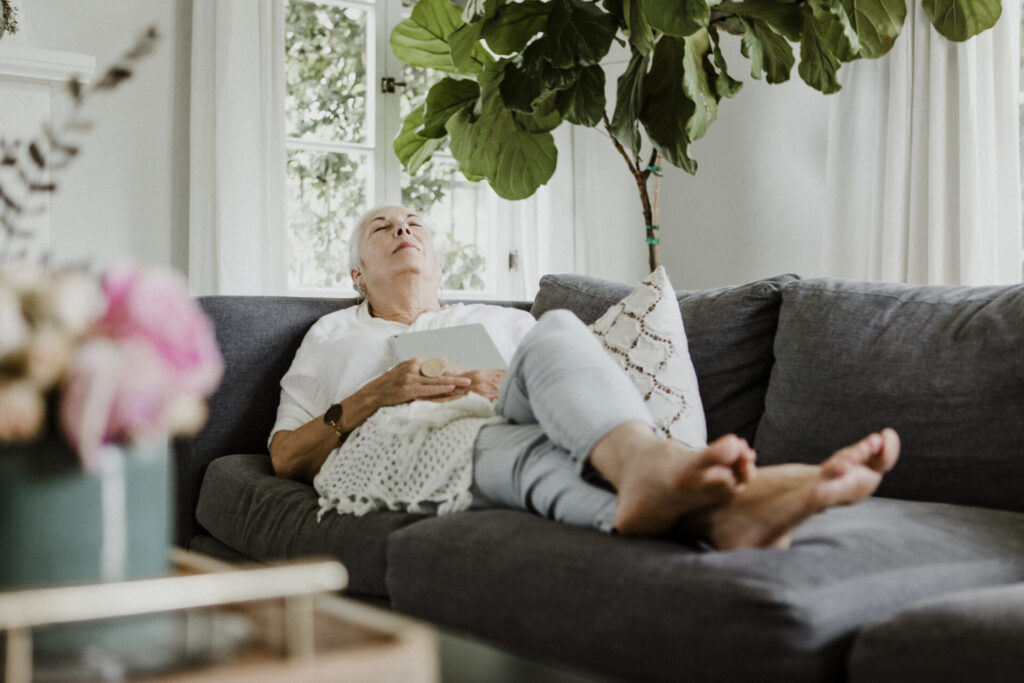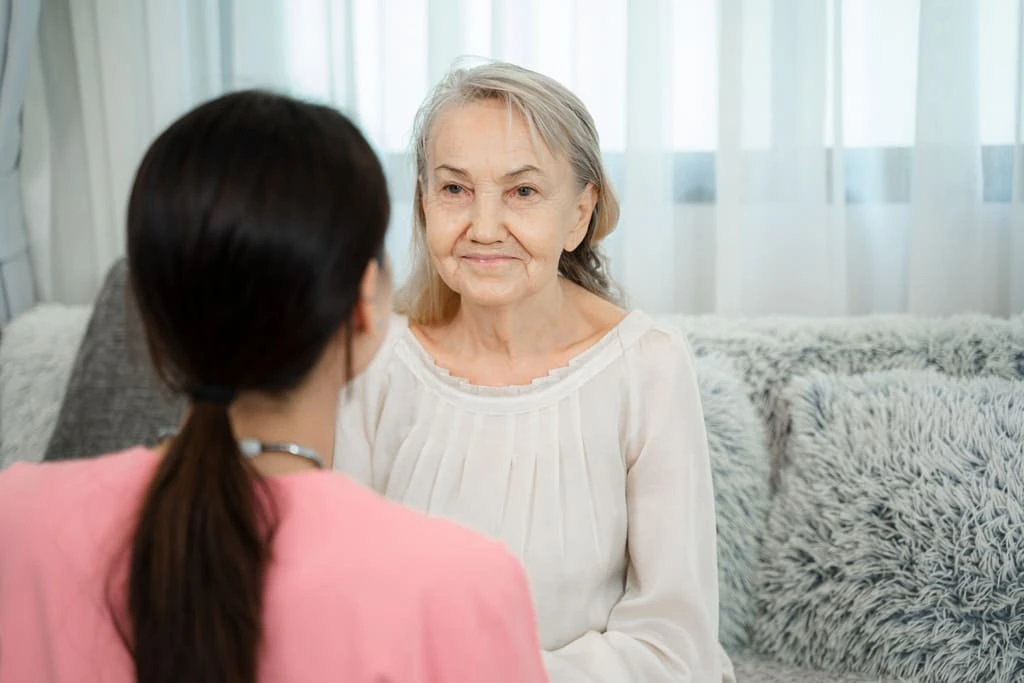What Is 24-Hour Home Care?
24-hour home care means a trained carer is present in someone’s home at all times – day and night -to provide support whenever it is needed. This can include help with personal care, medication, mobility, health needs, or staying safe during the night. Care is provided in shifts or through live-in arrangements, so someone is always there.
Beyond the practical side, it means being seen as a person, beyond the condition and diagnosis. It allows people to stay in familiar surroundings, keep routines that matter, and live life in a way that still feels like theirs. For families, it brings reassurance. For the person receiving care, it offers dignity, consistency, and the sense of being supported as a whole person, every hour of the day.
Why Families Choose 24-Hour Home Care
Families choose 24-hour home care because it offers safety, continuity, and peace of mind when support needs don’t pause overnight. Research and sector evidence consistently show that familiar environments reduce distress, anxiety, and confusion – particularly for people with complex physical needs, neurological conditions, dementia, or mental health challenges. Being at home allows daily life to continue in a way that feels known and steady, with support shaped around real routines rather than institutional timetables.
What often matters most to families is how this care feels:
- Knowing someone is always there, day and night
- Reducing risks linked to falls, medical needs, or night-time distress
- Avoiding repeated hospital admissions or residential placements
- Preserving dignity, identity, and personal routines
- Offering one-to-one support that is bespoke and person-centred
Who Needs a 24-Hour Home Care Provider?
People need a 24-hour home care provider when support needs extend beyond set hours and when safety, emotional well-being, or health requires continuous presence. Evidence across health and social care shows that gaps in support – particularly overnight – increase distress, risk, and crisis escalation. Continuous care helps maintain stability while allowing people to remain in familiar, predictable environments.
This level of care is often needed by people who:
- Are autistic, where routine, consistency, and familiar surroundings reduce distress
- Live with a learning disability, especially when support is needed with daily living, communication, or safety
- Experience mental health needs, including periods of anxiety, low mood, emotional dysregulation, or nighttime distress
- Have complex physical, neurological, or long-term health conditions
- Require regular support with mobility, personal care, or medication
- Experience night-time needs, confusion, seizures, or heightened anxiety
- Are transitioning from hospital to home and need close monitoring
- Feel unsafe or overwhelmed when left alone
Mental Health Recovery
Many people experience heightened distress, anxiety, or risk during quieter hours, when gaps in support can lead to crisis escalation or hospital admission. Round-the-clock support provides stability, safety, and reassurance in a familiar environment – all of which support recovery in a meaningful and sustainable way.
It supports mental health recovery by:
- Reducing night-time distress, isolation, and fear
- Offering immediate support during moments of emotional overwhelm
- Maintaining routines and predictability that support regulation
- Preventing repeated hospital admissions and crisis-led responses
- Supporting people as whole persons, beyond diagnosis or symptoms
Complex Care Needs
For people living with complex care needs, receiving personal care in the familiar and comfortable environment of their own home can be a significant factor in maintaining quality of life. Being at home supports emotional wellbeing, reduces distress, and allows care to fit around daily routines rather than forcing life to adapt to care.
24-hour home care can support people who:
- Live with complex physical, neurological, or long-term health conditions.
- Require ongoing assistance with mobility, personal care, or continence
- Need support with medication, nutrition, or clinical interventions
- Experience fluctuating or unpredictable health needs
- People at higher risk of falls, seizures, or medical emergencies
- Need reassurance, monitoring, or support during the night
This continuity of care is especially beneficial for people with progressive conditions, where requirements may evolve over time.
Having the same, familiar carer makes a real difference. When someone truly understands a person – their needs, habits, and what helps them feel settled – daily life becomes more predictable and safe. Over time, trust grows, communication becomes easier, and support feels less clinical and more human. Care is shaped around routines, preferences, and the way someone chooses to live, allowing home to remain a place of comfort, identity, and continuity.

Alzheimer’s Disease and Dementia
For people living with Alzheimer’s disease and dementia, 24-hour support is important because needs often change throughout the day and intensify during the evening and night. Research consistently shows that unfamiliar environments can increase confusion, agitation, and distress, while familiar surroundings help maintain orientation and emotional stability.
Continuous home care reduces risks such as wandering, falls, missed medication, and night-time anxiety, while providing consistent reassurance from carers who understand the person’s routines, communication style, and triggers.
Having someone present at all times supports safety, preserves dignity, and allows care to respond calmly to moments of confusion or fear, helping people remain at home for longer with continuity and a sense of security that residential settings can struggle to replicate.
Having continuous support helps manage risks, respond gently to moments of confusion or anxiety, and maintain daily routines with consistency. This steady presence allows people to stay in their own home for longer, supported by familiar faces and surroundings that offer reassurance and reduce distress in ways institutional settings often cannot.
Learning Disabilities
For people with learning disabilities, 24-hour home care is often needed when support is required with daily living, communication, or safety across the full day and night. Continuous support helps manage transitions, ease night-time anxiety, and respond early to changes in mood or behaviour before they become overwhelming.
Being supported at home by familiar carers allows routines to stay predictable and communication to be understood in ways that suit the person, rather than expecting them to adjust to unfamiliar environments or constantly changing staff. This consistency supports confidence, reduces distress, and helps people live with greater stability in their own home.
Brain Injury
For people living with a brain injury, 24-hour home care is often needed because needs can be complex, unpredictable, and change throughout the day and night. A personalised care plan, developed alongside health care professionals, helps ensure support reflects cognitive, emotional, and physical needs, while adapting as recovery or long-term challenges evolve. Live-in care arrangements or rotational support provide continuous presence, helping with memory difficulties, emotional regulation, mobility, and safety. Being supported at home by familiar carers allows structure and routine to be maintained, reduces frustration linked to unfamiliar environments, and supports rehabilitation in a setting that feels steady, respectful, and safe.

Types of 24-Hour Home Care Services
24-hour care at home can be delivered in different ways, depending on needs, routines, and levels of support required. Each option is built around a personalised care plan, ensuring care reflects daily life, preferences, and changing circumstances – while allowing people to remain part of their local community, close to familiar places, friends, and neighbours.
Medical and Nurse-Led Care
Medical and nurse-led care provides 24-hour support at home for people whose needs require clinical oversight alongside daily care. Delivered through a personalised care plan and guided by registered nurses and other healthcare professionals, this type of care supports medication management, clinical interventions, symptom monitoring, and early response to changes in health.
Having skilled nursing input available around the clock reduces avoidable hospital admissions, supports recovery and long-term condition management, and allows complex medical needs to be met safely in familiar surroundings, with continuity and clinical reassurance built into everyday care.
Household Support and Personal Care
Household support and personal care form the foundation of day-to-day wellbeing within a live-in care service, ensuring everyday life continues with comfort and dignity. This includes support with personal care, meal preparation, medication prompts, mobility, and maintaining a clean, safe living environment.
Having consistent support at home helps keep routines familiar and manageable, reduces physical strain, and supports independence in daily activities. Delivered as part of a personalised care plan, this type of care provides steady, practical assistance while allowing the home to remain a place of comfort, continuity, and normal life.
Companionship and Emotional Support
Research consistently shows that regular companionship reduces loneliness, anxiety, and depressive symptoms, particularly for people living with long-term conditions. Emotional support from a familiar, trusted presence helps regulate stress, improve mood, and support overall mental well-being, especially during periods of uncertainty or change.
Night-time Support: Overnight Care
Overnight care provides reassurance and safety during the hours when vulnerability is often highest. Studies show that anxiety, confusion, and risk of falls increase at night, particularly for older people and those living with long-term conditions. Having trained support available overnight helps respond promptly to physical needs or emotional distress, supporting restful sleep, reducing nighttime anxiety, and maintaining continuity of care in a familiar environment.
Benefits of Our Humanised Approach in 24-Hour Care at Home
At the core of our 24-hour care service lies a deeply humanised approach, a philosophy that prioritises not just the physical health but also the emotional and psychological well-being of our care recipients. This approach recognises each individual as unique, with their own set of preferences, histories, and needs
At Nurseline Community Services, our humanised approach transforms the care experience into a journey of shared moments and mutual respect, all within the comfort and familiarity of one’s own home. This benefits the care recipients and also brings peace of mind to their families, knowing their loved ones are being cared for with a touch of compassion and a deep understanding of their individuality.
Tailored Care for Individual’s Needs
Care is shaped around each person’s routines, preferences, and support requirements, ensuring support feels appropriate, respectful, and responsive.
- Support plans reflect personal routines, lifestyle choices, and daily rhythms
- Care adapts as needs change, with regular reviews and adjustments
- Support focuses on strengths, abilities, and maintaining independence
- Health, emotional, and practical needs are considered together
- Familiar carers provide consistency and understanding
24/7 Support
The provision of 24/7 support through live-in care represents a cornerstone of our commitment to ensuring the highest quality of life for individuals, regardless of their circumstances or the complexity of their needs. This round-the-clock presence guarantees safety and immediate response to any medical or personal care requirements and offers continuous emotional and psychological support.
This constant availability also allows timely adjustment of care plans in response to sudden changes in health or mood, ensuring that care is always relevant, responsive, and respectful.
Continuity of Care
The concept of continuity of care has a profound significance in the context of live-in care, particularly when it involves specialist care for complex health conditions. This model ensures that the individual receives constant care from a dedicated team or caregiver, allowing for a deep understanding of the care recipient’s medical history, personal preferences, and daily routines. The persistent presence of an attentive caregiver ensures that all aspects of care-from administering medications and monitoring health to assisting with daily activities and providing emotional support-are seamlessly integrated into the individual’s life.
This continuity and attentiveness in live-in care contribute to a holistic care experience, ensuring that the individual’s needs are met with compassion and expertise at every step.
Social Life
Maintaining an active and fulfilling social life is vital to overall well-being, especially for individuals with specific care needs. Personalised support in this context goes beyond mere physical or medical assistance; it encompasses understanding and facilitating the individual’s social preferences and desires.
A caregiver attuned to these needs can play a crucial role in enabling social interactions, whether arranging visits from friends and family, assisting with communication technology to stay connected with loved ones, or accompanying the individual to social events and activities. This aspect of personalised support is essential, as it not only caters to the care recipient’s emotional and psychological health but also promotes a sense of belonging and joy. By ensuring that social life remains an integral part of their routine, caregivers can greatly enhance the quality of life for people under their care, making each day more meaningful and socially enriching.
Improved Quality of Life
The ultimate goal of providing comprehensive and personalised live-in care is to significantly improve the quality of life for people under our care. By addressing the full spectrum of an individual’s needs-physical, emotional, social, and medical-we create an environment where they can thrive, not just survive. This improved quality of life manifests in everyday joys, a sense of security, and the freedom to live with dignity in one’s own home.
At Nurseline Community Services, our dedicated caregivers play a pivotal role in this, offering skilled care, companionship and understanding, ensuring that every day is lived to its fullest potential.
24-Hour Care at Home as Key to Independence
24-hour care at home is pivotal in fostering independence for individuals who require constant support, striking a balance between necessary assistance and personal autonomy. This form of care allows individuals, especially those with chronic conditions, disabilities, or age-related challenges, to continue living in the comfort of their own homes while receiving the comprehensive care they need. With caregivers present continuously, people are assured of immediate assistance with daily tasks, medical needs, and emergencies. This support is provided in a way that encourages and enables them to engage in as many of their own activities as possible.
Additionally, this approach promotes a sense of self-sufficiency and control over one’s life, as well as higher self-esteem and quality of life.
Family Involvement and Support
This care model provides families with the assurance that their loved one is receiving continuous, professional care, alleviating the stress and worry that often accompany caregiving responsibilities. Families benefit from the expertise and guidance of trained caregivers, gaining valuable insights into managing specific health conditions and understanding the best ways to support their loved ones.
Additionally, this arrangement allows family members to maintain their own lives, careers, and responsibilities without the overwhelming duty of full-time caregiving, fostering a healthier family dynamic. Regular updates and open communication with the care team ensure families are involved in care decisions and remain connected to their loved one’s well-being. This collaborative approach enhances the quality of care for the individual and reinforces family bonds, as members can spend quality time with their loved ones, free from the pressures of caregiving duties.
24-Hour Care with Nurseline Community Services
24-hour care with Nurseline Community Services offers a humanised, professional approach to round-the-clock care tailored to each person’s unique needs.
We understand that everyone is different and has distinct care requirements. Our dedicated team of clinicians is trained to provide specialised support for a range of needs, including complex mental health needs. Our clinicians are not only skilled in medical and personal care but are also compassionate individuals who strive to build meaningful connections.
We ensure that our care plans are flexible and adaptable, evolving with the changing needs of each person we support.
We pride ourselves on our holistic approach, which focuses not only on physical health but also on the emotional and social well-being of the individuals we care for.
If you or your loved one requires 24-hour care, contact us today.
Let us discuss how we can support you in maintaining independence, comfort, and quality of life in the familiar surroundings of your home. Our team is here to provide the care and support you deserve every step of the way.




